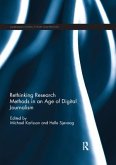The Routledge Handbook of Developments in Digital Journalism Studies offers a unique and authoritative collection of essays that report on and address the significant issues and focal debates shaping the innovative field of digital journalism studies. In the short time this field has grown, aspects of journalism have moved from the digital niche to the digital mainstay, and digital innovations have been 'normalized' into everyday journalistic practice. These cycles of disruption and normalization support this book's central claim that we are witnessing the emergence of digital journalism studies as a discrete academic field.
Essays bring together the research and reflections of internationally distinguished academics, journalists, teachers, and researchers to help make sense of a reconceptualized journalism and its effects on journalism's products, processes, resources, and the relationship between journalists and their audiences. The handbook also discusses the complexities and challenges in studying digital journalism and shines light on previously unexplored areas of inquiry such as aspects of digital resistance, protest, and minority voices.
The Routledge Handbook of Developments in Digital Journalism Studies is a carefully curated overview of the range of diverse but interrelated original research that is helping to define this emerging discipline. It will be of particular interest to undergraduate and postgraduate students studying digital, online, computational, and multimedia journalism.
Essays bring together the research and reflections of internationally distinguished academics, journalists, teachers, and researchers to help make sense of a reconceptualized journalism and its effects on journalism's products, processes, resources, and the relationship between journalists and their audiences. The handbook also discusses the complexities and challenges in studying digital journalism and shines light on previously unexplored areas of inquiry such as aspects of digital resistance, protest, and minority voices.
The Routledge Handbook of Developments in Digital Journalism Studies is a carefully curated overview of the range of diverse but interrelated original research that is helping to define this emerging discipline. It will be of particular interest to undergraduate and postgraduate students studying digital, online, computational, and multimedia journalism.
"In today's rapidly shifting digital media world, industry developments that seemed radical only a few years ago may be suddenly passé ... and old thoughts and theories may be due for a rebirth. The Routledge Handbook of Developments in Digital Journalism Studies tracks these rapid changes with clarity and insight."
C.W. Anderson, Professor of Media and Communication, University of Leeds, UK
C.W. Anderson, Professor of Media and Communication, University of Leeds, UK









